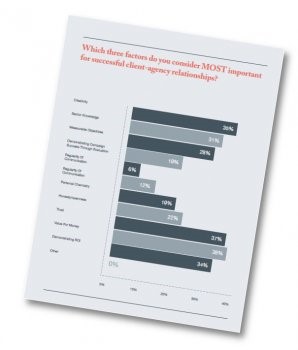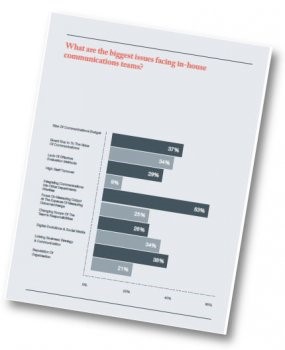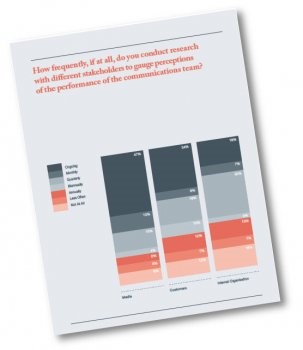
ON THE MARK
The PRCA’s annual In-House Benchmarking Survey pinpoints the trends in communications. Ruth Nicholas explores the results
There is a sense of qualified optimism that comes through the results of this year’s In-House Benchmarking Survey, just released by the PRCA. Budgets have stabilised, the vast majority of respondents reported no redundancies in the past 12 months and employment prospects are even improving for senior staff.
 That said, the battle for authority, recognition and strategic influence is far from won. Last year’s research showed that 57% of participants saw themselves as being part of a significant corporate team that operates at a strategic level, while less than a quarter viewed themselves as facilitators The PRCA’s annual In-House Benchmarking Survey pinpoints the trends in communications. Ruth Nicholas explores the results On the mark who take instruction and execute the orders of others. This year has seen a small but significant shift with only 49% confident to claim a strategic role. PRCA director general Francis Ingham says, “Half of respondents view themselves as significant corporate teams that drive and manage reputation – but we still need to see a higher number of proactive in-house teams taking control, not taking instructions.”
That said, the battle for authority, recognition and strategic influence is far from won. Last year’s research showed that 57% of participants saw themselves as being part of a significant corporate team that operates at a strategic level, while less than a quarter viewed themselves as facilitators The PRCA’s annual In-House Benchmarking Survey pinpoints the trends in communications. Ruth Nicholas explores the results On the mark who take instruction and execute the orders of others. This year has seen a small but significant shift with only 49% confident to claim a strategic role. PRCA director general Francis Ingham says, “Half of respondents view themselves as significant corporate teams that drive and manage reputation – but we still need to see a higher number of proactive in-house teams taking control, not taking instructions.”
Board level representation has fallen slightly from 76% last year to 72% in 2013. It appears that the ebullience evidenced in last year’s assertions that communications would become more important in the coming year (65%) and over the next five years(71%) has been tempered.
In 2013, 35% of respondents believe communications will become more important at the strategic level with 29% confident that it will become much more important.
“The battle for influence in the boardroom is far from won. Recent examples such as the horsemeat crisis and at the BBC show that communications decisions need to be made right at the top, or the organisation’s trust – and its financial bottom line – will suffer,” Ingham observes.
 Responses to questions on the role of communications and the key issues facing in-house teams indicates that the somewhat siege mentality associated with straitened economic times has lifted. For instance, size of budget has ceased to be the most pressing issue, dropping to fourth in the charts. Forty percent of respondents expect budgets to stay the same and 25% expect them to increase somewhat. Equally, the emphasis on defence has shifted; in last year’s report, protecting the organisation’s reputation ranked above building awareness, this year those positions have been swapped. The stress on monitoring reputation has also decreased.
Responses to questions on the role of communications and the key issues facing in-house teams indicates that the somewhat siege mentality associated with straitened economic times has lifted. For instance, size of budget has ceased to be the most pressing issue, dropping to fourth in the charts. Forty percent of respondents expect budgets to stay the same and 25% expect them to increase somewhat. Equally, the emphasis on defence has shifted; in last year’s report, protecting the organisation’s reputation ranked above building awareness, this year those positions have been swapped. The stress on monitoring reputation has also decreased.
However, it’s not all good news. While fiscal worries have lessened, concerns about the role of communications in an operational sense remain significant and in some areas have grown. The key issue facing communications teams highlighted by the greatest number of respondents was integrating communications into other departments’ priorities, followed by linking business strategy and communications, lack of understanding of what PR and communications does and size of budget, and board buy-in to the value of communications.
Comms teams, however, may need to enact evaluation of a more frequent and more rigorous nature to gauge their performances with stakeholders. Some 26% either never ask for internal stakeholder views or do so less than once a year, 40% never or less than annually evaluate with customers and a whacking 60% with media. However, this represents a marked improvement on last year’s equivalent answers (66% infrequent or never asking internal audiences, 56% with customers and 79% with media), but significant progress has yet to be made.
The mechanisms used also require attention. Ingham worries about the continued use of the advertising value equivalent (AVE) as a means to assessing comms teams’ contribution, “We must urgently move on from merely stating that AVEs are of no value to measurement by providing a global alternative that all clients can recognise. People will ignore you unless you give them a reason to stop using AVE.”

When it comes to evaluating client/agency relationships communications folk have no problem looking at more difficult measures. The most important factor, according to 38% of respondents is value for money, down from 54% in 2012, which suggests a lesser degree of pecuniary preoccupation. Ingham says the economy’s stability is an influencing factor, “The fact that value-for-money is the most important factor in a client-agency relationship shows that budgets and the economy remain salient.”
There is an interesting if not altogether surprising disconnect between value for money and creativity when looking at attitudes to pitching then subsequent relationship management. Creativity remains king when it comes to pitching. In-house teams predominately use external agencies to fill a skills gap (44% of the sample) and naturally they look for great ideas – creativity is the most important factor for almost half of the sample. Once the business is won the emphasis shifts and cynics might say that quality of thought becomes less important than the number of hours put in and the amount of over-servicing in which agencies are willing to engage.
The growing use of procurement has consultants worried. Procurement departments are considerably more sophisticated these days and are no longer just the bean-counting, number-crunching nerds of yore.
But – and it’s a big but – are specialists in procurement really best placed to evaluate something as amorphous, nay esoteric, as creativity in communications? No prizes for guessing the answer the average consultant would give.
When it comes to counting the pennies, comms people are doing pretty well, at least at the top of the tree. More than half of those surveyed said that communications directors earn in excess of £75,000, with 16% on up to £90,000 as a basic salary, 23% on £90,000-£120,000 and 16% on over £120,000 per annum. Some five percent of directors have bonus potential of over £50,000.
The pressures on communications directors are not likely to decrease, but the bleakest days of doing more with less seem to be behind us. The challenge now is less about protecting budgets and more about gaining rightful recognition.



